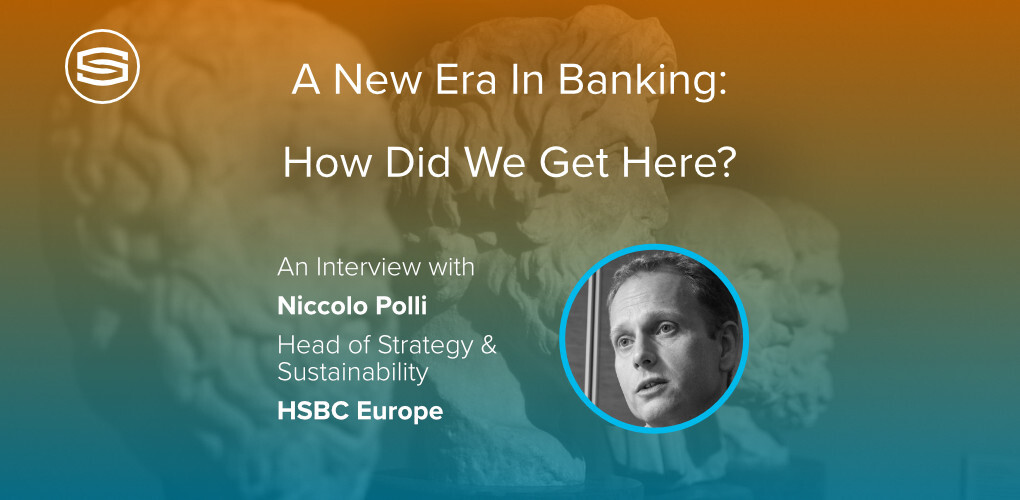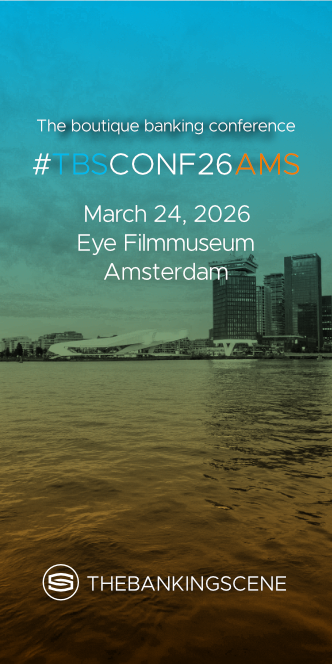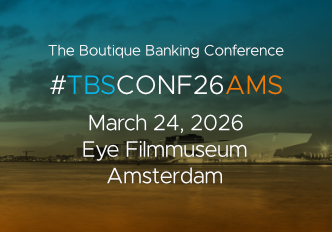
Insights & Opinions
A New Era In Banking: How Did We Get Here? An Interview with Niccolo Polli - Head of Strategy and Sustainability at HSBC Europe
Sun, 12 Nov 2023


One of the headline speakers at The Banking Scene Conference 2023 Brussels was Niccolo Polli, Head of Strategy and Sustainability at HSBC Europe. He spoke about the New Era in Banking in the context of the sustainability agenda.
I contacted him again for a deeper discussion on ethos, sustainability, and the banking industry challenge to lift trust again by taking responsibility on the road to a greener future.
How would you define Ethos in Banking?
Ethos is not so much about ethics as it is about character, and in the context of banking, I would say culture. So, if you say we need a new ethos in banking, to me, this refers to a cultural change that is required in the industry. In that context, the key question is: what is wrong with the current culture in the banking industry, and how did we get here?
To make my point, I like to fall back on my timeline of how Hollywood has portrayed banking across the ages. Movies present a good reflection of how the public perceives banks and what they are about. Back in the 80’s, you had movies like Trading Places and Wall Street. The bankers in these were very wealthy, somewhat detached from the realities of the everyday person and perhaps not the kindest, but they did not represent evil. Indeed, there was often something intriguing about them that even made you relate or admire them. Gordon Gekko coined the (in)famous phrase “Greed is Good” as he explained what he saw as the essence of unbridled capitalism and his role within that. This, in some ways, captured the essence of the American dream at that time.
In the 90’s, Hollywood’s portrayal of Banks started going a bit downhill with movies like Rogue Trader and Barbarians at the Gates. But even in these films, the bad guys were the people (the rogue trader and the barbarians), not so much the institutions. The institutions seemed ok, but of course, there were some bad apples and some bad actors. But banking wasn't portrayed as evil.
Then 9/11 happened, and for a decade, there were no films on banking because it just wasn't a very relevant topic for Hollywood. But there is a key reason why I'm linking back to 9/11, which is around terrorist financing: in theory, and perhaps in practice, 9/11 would not have happened if money didn't make it into criminal hands. At the time, no one blamed the banks for this because mitigating criminal activity did not seem to be their role.
Then in 2008 we had the financial crisis, and you remember the start of this financial crisis, the popular narrative was: “Oh, it's a banking crisis, not an economic crisis. The banks are blowing up.” Right. It's not perceived as an economic crisis at first. People said: “It's not going to impact us”.
Well, we all found out very quickly that a banking crisis either becomes an economic crisis or portends an economic crisis. Banks feed into the real economy through unpaid mortgages, decreased lending, reduced savings, interest rates and more. Unemployment rises and so, people start quickly understanding the link between banks and the real economy.
US unemployment went from mid 4% to near 10% in the space of one year. Millions of people lost their jobs, had their homes repossessed and had to close shop. And, in the mind of consumers, the banks were to blame. Yet Banks got rescued and Goldman Sachs even paid out record bonuses of $16.7 billion that year. There was a clear detachment from what was happening in the real world. This is 2009 and this I think is when the ‘Gordon Gekko banker’ plummeted in the esteem of the everyday person.
That is now almost 15 years ago. Was that the moment when you witnessed a disconnect between banks and the real world?
I think so. Going back to my Hollywood timeline: that's when Hollywood’s portrayal of banks changed. Hollywood made Too Big To Fail, Margin Call, Arbitrage, and The Wolf of Wall Street. In these films, these people were portrayed as having no ethics whatsoever, no morals. The Wolf of Wall Street was almost a parody, it was so over the top.
Dirty Money was also released around that time to rave reviews by rotten tomatoes. It told of stories of corruption and corporate scandals and, in a couple of episodes, took a deeper look into the financial system and the role it played it miss-selling products, the financial crisis and even how drug cartels funnelled their cash through the banking system. Banks were not portrayed in a positive light at all. Banks were unloved, people had lost trust in them, and now they were fair game and helped sell stories and improve ratings.
In the 2010s, banks were not only paying fines for what went wrong in terms of KYC (Know Your Customer) and anti-money laundering (AML) deficiencies, but they were investing billions in compliance, building out teams across the world to make sure that financial crime compliance was upgraded to the needed specs. So, a huge portion of profits and investment was diverted into these two endeavours leaving the customer experience a distant third. This added insult to injury: not only were the banks being vilified and portrayed in this negative light, but at the same time, customer experience degraded significantly (also partially as a consequence of enforcing more stringent KYC/AML procedures and controls).
Trust plummeted to the 30%’s and has yet to improve to pre-crisis level. Only 70% of people say they trust their banks to do what is right, and only 35% of adults are confident that banks can keep their money safe (US statistics, March 2023). That has to be the most basic thing that you ask from a bank is to keep your money safe!
So, today I see a tremendous opportunity for the industry to change its ethos, to change its culture and public perception.
We are currently in a global crisis, and that is Climate change. Scientifically speaking, you must go back 3-4 million years when the world was hotter than it is today. We know that there is a direct link between carbon dioxide in the atmosphere and the planetary temperatures. We also know how to slow and/or stop global warming, and we have most of the tools and technology at our disposal to do so. And banks have a role to play in making this happen.
So, as you explained at The Banking Scene Conference 2023 Brussels, after the lost decade between 2010 and 2020, we will see a new era where banks must take responsibility in the transition to a new, ecological economy and society?
In as much as it is not a regulatory requirement, Banks don’t have to take responsibility. However: One, waiting for regulations to force the right behaviour is never a winning strategy and history judges harshly on that. Finance has an important role to play and with that comes some form of moral obligation. Two, this global transition is an enormous opportunity that we would be remiss if we did not try and capture.
At HSBC, we aim to achieve net zero in our operations and supply chain by 2030 and in our financed portfolio by 2050. Between now and then, we’re working with our clients to help them reduce their emissions and scale up low-carbon solutions as we work to reduce our own. At its most simplistic, we need to move the economy from carbons to electrons. This is the transition we’re talking about.
We have reviewed our entire lending portfolio, and determined what it takes to get the portfolio to net zero by 2050. We know that there are only a few sectors that matter and established a transition pathway for each sector in our portfolio and for each region.
What we then do, is look at individual companies and assess their transition pathways against our own projections. If the company is transitioning faster than required, it helps us transition faster, and therefore we rate that company positively from a sustainability and transitioning lens and we can even incentivise them with better pricing or product conditions. If the company is taking longer to transition, we will reduce our financing appetite towards that company.
When we look at the technologies out there, we think that we have a pretty clear pathway to achieve our 2030 goals. We estimate that existing technologies can help us achieve at least 80% of that target. For 2050, we're much less certain of what that looks like from a technology perspective. Existing technologies can get us probably only 50% of the way there. So we need to invest in innovation otherwise we will be unable to achieve our goals. So innovation is the third leg that we look at: (i) our own footprint including suppliers, (ii) our financed emissions and then (iii) helping drive innovation. All of these are key to transitioning to the new ecological economy you mention.
And so, we see a new era in banking. Perhaps it goes hand in hand, but according to you: do we need a new ethos in banking?
Ethos is probably not the word I would use: I would prefer culture. And I do not believe it is mandatory to change the banking industry’s culture or perceived brand, but it would certainly be rather helpful in many ways, not least to re-establish the trust lost over this last decade.
We have the ability to solve this problem or at least help solve this problem of climate change, and so we should. We need to live up to the expectations placed on us and also take advantage of this opportunity not just for the bank, but also for our civic responsibilities. This also allows us to rekindle our purpose as a bank to society at large. And I don’t think this is just grandiose talk. Well-functioning and well capitalised banks are fundamental to help economies and societies grow by providing funding to people and companies that can use it most effectively. And now we need to transition world economies from carbon to electrons and banks will be fundamental in making this happen.
Now, there's also a downside to this, which you have probably seen, and that is that people don't necessarily believe this kind of magnanimous speak from a banker. They point to greenwashing and ulterior motives. This is the negative side of the story where people don’t believe these statements are necessarily made in good faith or with good intentions.
And this brings us back to trust and to what we were mentioning earlier. The industry must win back people’s trust so that they can help us transition these economies.
There is an additional thing I would add, and that is that we also need to consider our own footprint in this equation. Now, our CO2 footprint is tiny compared to our client portfolio because our footprint is really office buildings, travel, electricity and gas consumption and general waste. But we still need to get it down to net zero, and we have committed to make that happen by 2030. Now the net part is important because we will always have buildings, and we’ll always have people, and they'll always travel and use computers and so on. So we need to offset our footprint through high-quality nature-based carbon credits, which we have started doing. We are building up our portfolio so that from 2030 onwards, we will be net zero globally. And hopefully, by that time, we will have convinced the market and our customers of our true intentions to help resolve climate change and transition the world from carbon to electrons.


